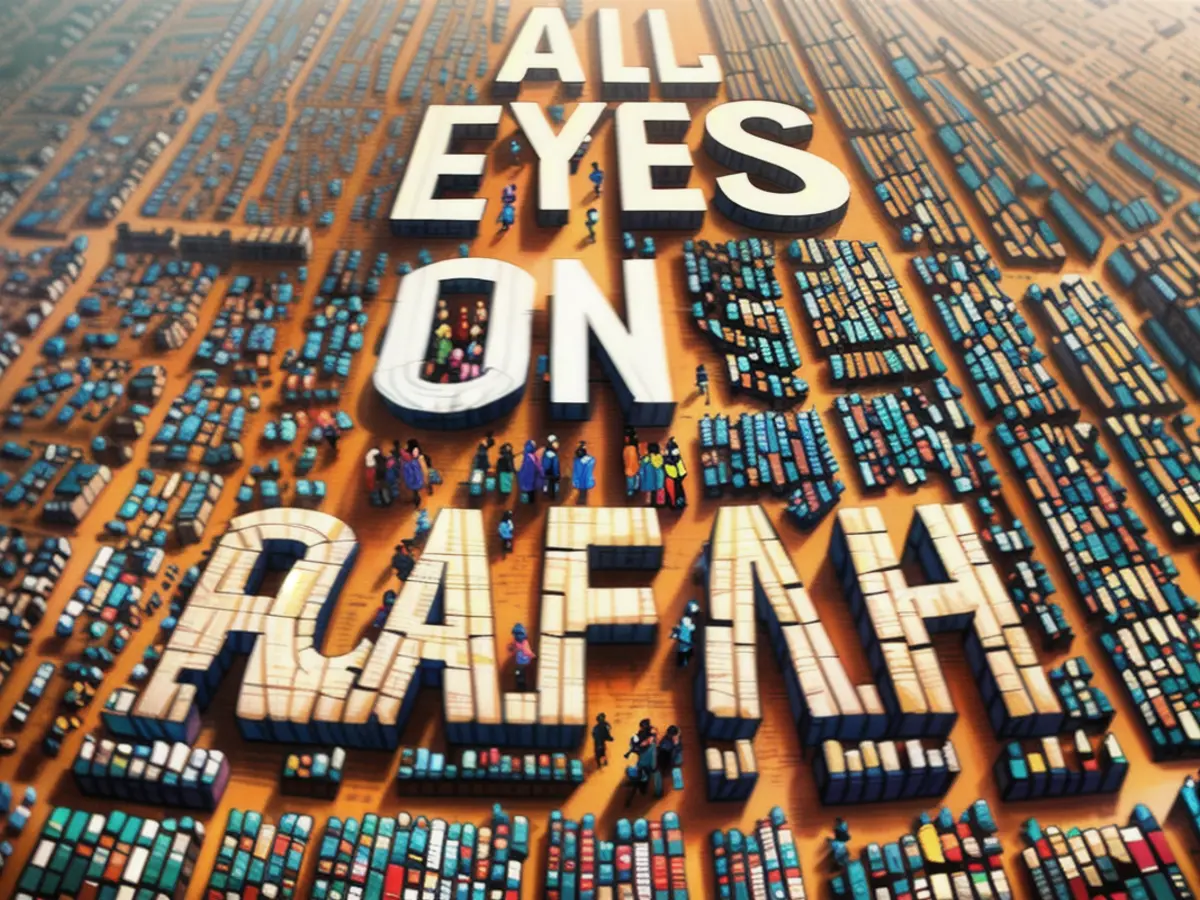Strife in the Middle East region - Expert on fake Rafah photo: "It's uncertain who's employing it for other objectives"
For the past few days, a photo produced by AI has been circulating on Instagram, claiming to show a refugee camp near the Palestinian city of Rafah. This plot of land is covered in tents that span as far as the eye can see, forming the English phrase "All Eyes On Rafah" in the center.
It's likely that many users might have realized that this tent village isn't real after sharing the initial post from user Shahv4012 - especially given that the creator of the image also shares content with anti-Semitic undertones. However, the more than 40 million people who have reacted to this picture wanted to show their support for the people in the disputed location. A media scientist discusses the situation.
A spokesperson from media science weighs in
Professor Jan-Hinrik Schmidt from the Leibniz Institute for Media Research comments to stern magazine: "The rapid spread of this picture can be attributed to three factors. First, it's visually striking and easy to comprehend upon initial glance. Second, sharing content on Instagram is incredibly simple. Here, the "You're Here" feature allowed the post to be shared through one's own story in just a few steps. Fashion model Bella Hadid, who has 61 million Instagram followers, also used this function. The media coverage surrounding the image further fuels its popularity, causing it to be shared even more.
"The image can also demonstrate the way individuals voice their current emotions. The phrase 'All Eyes On Rafah' conveys a clear message: Pay attention to what's happening in Rafah. People can easily share this image due to its clear and unambiguous nature," adds Schmidt.
"There's also a chance that some individuals who share the picture may hold different intentions or even come from Palestine themselves, having strong feelings about the ongoing conflict. This combined with the conflicting viewpoints of the two groups makes for a stark contrast," explains Schmidt.
Users are still accountable
The average person might not have the time, patience, or expertise to scrutinize who shares similar content. "When something goes viral, it becomes impossible to track who uses it for different purposes or shared in different contexts," stresses Schmidt.
However, Schmidt notes that users bear responsibility for their actions in social networking platforms. "We're not just mere recipients—we're also senders. By liking, commenting, and sharing, we're actively contributing to the spread of information, which can have consequences," he cautions.
The situation in Rafah
Towards the beginning of May, Israeli forces made their way into Rafah city, which is considered a stronghold for Hamas in the southern Gaza Strip. Since then, residents of the city have reported barrage fire and combat operations.
Eyewitnesses described ongoing fighting in both the city's center and west. They also informed the news agency AFP that Israeli troops had destroyed several structures in the city's eastern area. The humanitarian situation is increasingly precarious.
Read also:
- Telefónica targets market launch for hologram telephony
- vzbv: Internet companies continue to cheat despite ban
- Telefónica targets market launch for hologram telephony in 2026
- AI and climate in schools: how to keep lessons up to date
- Despite the controversy surrounding the artificial intelligence-generated photo of a supposed refugee camp in Rafah, the image has gained significant attention in the Middle East conflict, with over 40 million people expressing support for the people in the disputed location, including celebrities like Bella Hadid.
- In the midst of the ongoing Israel-Palestine conflict, the city of Rafah, a stronghold for Hamas in the Gaza Strip, has been under pressure, with residents reporting barrage fire and combat operations since Israeli forces entered the city towards the beginning of May.
- In light of the spreading of misinformation and the potential biases in artificial intelligence-generated content, media experts like Professor Jan-Hinrik Schmidt emphasize the responsibility of users on social media platforms, stressing that by liking, commenting, and sharing content, they are actively contributing to the spread of information and its consequences.
Source:








